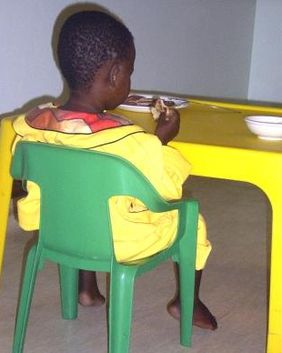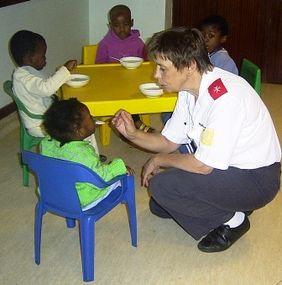It is Wednesday 9 May. We got a call for a home visit. In principle, nothing unusual, because relatives or neighbours often call us and tell us that there is a sick person in the family or neighbourhood. We then go there and see what needs to be done. Whether we take him to the care centre or whether he has to go to the basic health unit or to hospital is decided on the spot. This call came from a woman whose niece seems to be in a bad way. So we go there to have a look at the child. When we arrived, we found Nyekeni*, a girl of about 4 years, completely apathetic, with her nappy open, lying on the sofa. The aunt told us that the child had had diarrhoea for a long time and that she had not been walking for about a week. Nyekeni lived with her aunt and uncle because both parents had died. The sister took care of all the formalities and we took Nyekeni to the care centre.
She seemed very distraught, did not walk, did not talk and could not eat properly. When I wanted to bathe and wash her, there were big problems because she did not want to sit in the water and certainly did not want to be washed, especially in the intimate area. When I was drying her and applying lotion, I noticed that something was wrong and told our nurse. She looked at the little girl and agreed with me. She called our doctor who examined the child and said that in any case the little one had been "tampered with". The medical officer who was called in determined that it was not rape, but the fact that she was so disturbed and could not or would not walk or talk was a clear indication that Nyekeni had been abused. The police were satisfied with the medical report and probably did not investigate due to lack of evidence.
In our care centre, we have always taken care not only of the dying, but also of people who would otherwise not get any help, and so it was quite natural for us that Nyekeni could stay with us for the time being. We now tried to make the little one feel comfortable with us and to make her feel that she does not have to be afraid. She always stuffed so much food into her mouth that she could hardly chew it and in the meantime she had both hands full of food again to stuff it down. That was very noticeable. When I washed her every day, I tried to teach her that she could do it on her own, especially in her private parts, where she didn't want anyone to get at them.
After a few days we tried the first steps, it was very difficult for her and without help it didn't work at all, but we practised diligently, because of course she wanted to walk around in the room and on the terrace like all children.
After a few weeks we could already see some success, at least with walking. She was not yet able to eat well and did not want to speak at all. She played with the children, came to cuddle like the others, but somehow she still seemed very disturbed. She continued to make good progress in walking, eating and playing with the children.
Weeks later, Nyekeni could be discharged after she was feeling much better and we have to trust that the social worker who was brought in has rehabilitated the environment so that she will continue to do well.
Angelika Müller
* Nyekeni (Zulu for "Leave me in peace!") is not her real name.

